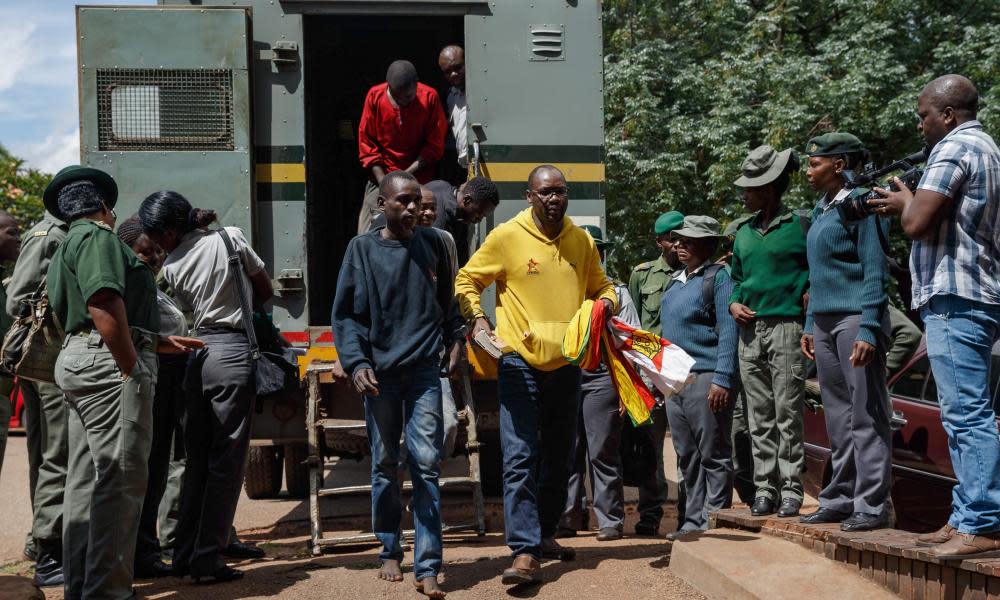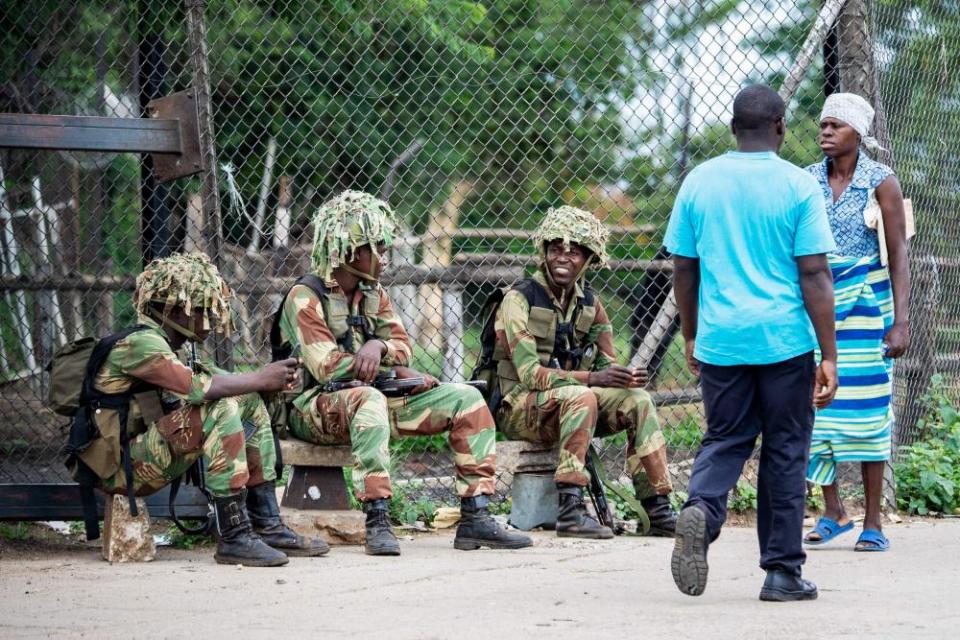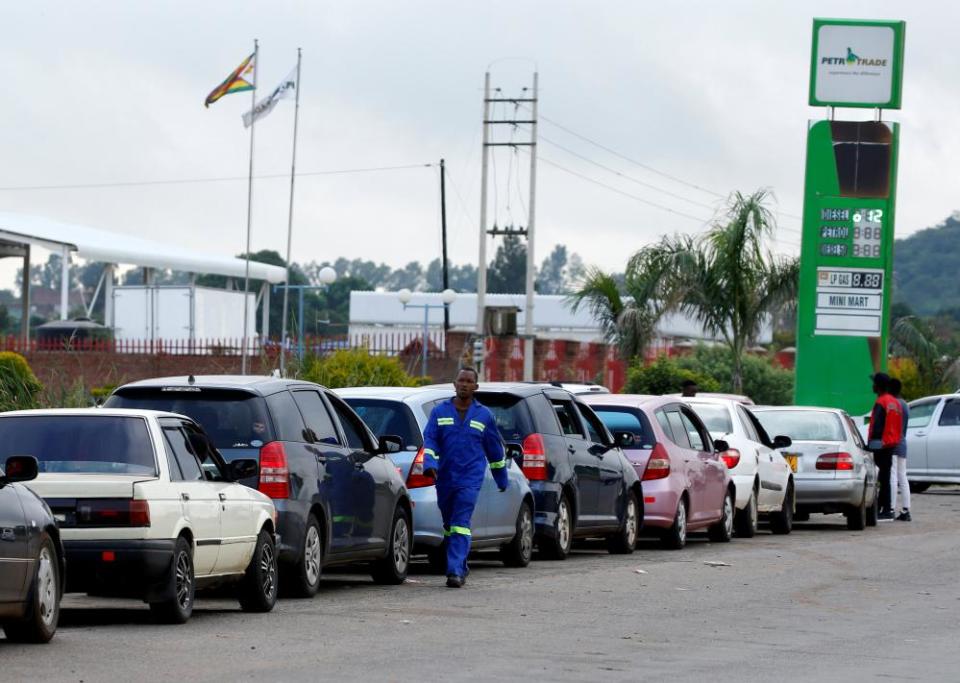Zimbabwean activists on run as protests crackdown raises spectre of Mugabe era

Hundreds of activists remain in hiding in Zimbabwe, on the fifth day of the worst government crackdown since the ousting of Robert Mugabe.
Soldiers and unidentified armed men conducted door-to-door searches in poor areas of cities on Friday, dragging “random” residents out of homes to be beaten and often detained, activists said. The Zimbabwe Association of Doctors for Human Rights said it had treated 68 cases of gunshot wounds and 100-plus other cases of “assaults with sharp objects, booted feet, baton sticks” and more in recent days.
Security forces have arrested between 400 and 600 suspects since Monday, the start of a national “stay-at-home” protest called by unions after a massive increase in the price of fuel began on Monday, well-informed NGOs estimate. Twelve people are thought to have died after being shot.
“I’m just moving from house to house every day, trying to limit my contacts, telling no one where I am. I’m trying to keep ahead of the intelligence services and the spies … It’s a very tough period,” said one activist who publicly backed the protests, speaking by telephone from an undisclosed location in Zimbabwe on Friday evening.
Many of those detained are being held without charge in overcrowded prisons and police cells. Some may face new fast-track trials, ordered earlier this week, on charges that could bring long prison sentences. Four hundred detainees, largely charged with public order offences, were produced in batches of 50 before magistrates in Harare on Friday afternoon and denied bail.
Though some are leading trade unionists and organisers in the main opposition party, the Movement for Democratic Change (MDC), many are ordinary people swept up in the biggest security operation seen in Zimbabwe for many years.

Pastor Evan Marawire, a high-profile social media activist arrested on Wednesday, told reporters as he was brought to magistrates court that the crackdown was reminiscent of the Mugabe era.
Mugabe’s authoritarian 37-year rule was ended in November 2017 by a military takeover, prompting widespread optimism that the repression of previous decades was over.
But any faint hopes of political reform under Emmerson Mnangagwa, the ruling Zanu-PF party stalwart who took power and won elections in July, have been extinguished. The crisis has attracted fierce criticism from western powers, and will undermine Zimbabwe’s efforts to rejoin the international community after decades as a pariah.
Mnangagwa is currently travelling in central Asia, Russia and Europe in an attempt to rally international support and investment that might stave off the total collapse of the country’s economy. Vice-president Constantino Chiwenga, a hardliner who is blamed for the shooting of six civilians during protests days after last year’s elections, is in charge.
“They must have anticipated what was going to happen so the suspicion is that this is part of a good cop, bad cop routine. Chiwenga can deal with [the protests] with a very heavy hand and then Mnangagwa can say: ‘Very sorry, we’ll have an investigation,’ and still seem to be Mr Nice Guy,” said Derek Matyszak, an analyst in Harare.

Marawire, denied bail on Friday, faces the same charges of incitement to violence and subversion now as he did two years ago before Mugabe’s resignation. He said he was innocent.
He announced the protest on Sunday in a video clip alongside Peter Mutasa, the president of the Zimbabwe Congress of Trade Unions (ZCTU). Mutasa, an outspoken critic of the new government, has not been heard from since Tuesday, when he contacted colleagues to tell them his house had been raided.
“We are worried about Peter and we hope he hasn’t been arrested,” said Tiri Marimo, a senior official of the ZCTU. Marawire’s sister, Telda, said she had discussed the possible consequences of her brother’s actions with him at the weekend.
“The conditions in prison are deplorable and can break even the strongest man. That is a frightening thing for him to go through. He was very worried about how this would go but resolute that there was no way he could keep quiet,” she said.
Energy Mutodi, the deputy information minister, said the police had “initially applied minimal force to disperse marauding crowds” before escalating their response to stop “a looting spree by hooligans”.
Mugabe’s rule left Zimbabwe with vast debts, a crumbling infrastructure and soaring unemployment, especially among young people. Most of its 16 million people live hand-to-mouth, or survive on remittances from the extensive diaspora.
The fuel price rise, of about 250%, is the latest blow to millions of citizens who are increasingly unable to buy basics such as fuel, food and medicines.
Inflation is running at 40% – its highest rate since hyperinflation forced Zimbabwe to abandon its own currency 10 years ago in favour of dollars, electronic cash and so-called “bond notes” issued by the central bank.
“People came on to the streets spontaneously, and in anger, which is rare for Zimbabwe. What then appears to have happened was that activists got together to try to challenge that anger,” said Matyszak. The response “was a continuation of the Mugabe style of dealing with dissent”.
The southern city of Bulawayo was badly hit by looting and rioting earlier in the week. Though there has been limited public disorder since Wednesday, few inhabitants are venturing on to the streets patrolled by armed soldiers unless desperate.
“It is getting very complicated. People are running out of food but there have been almost no deliveries of bread. There are very long queues to just get anything. There is a huge number of people who need medicine too. So everyone is afraid,” said one activist in the city.
In Harare, the atmosphere was calmer than on previous days, but police still controlled queues for food and fuel while injured people streamed into a private hospital in the capital.
Joelson Mugari, an MDC organiser, said a group of 10 men, including two soldiers, had assaulted him after banging on his door at 7.30am on Friday morning in Ngwenya, an outlying district of Harare.
“They told me: ‘You are the ones organising the stay-away and we will teach you a lesson.’ Then they started hitting me on the head and all over,” said Mugari, who was treated secretly at a clinic in Harare.
Mainstream opposition politicians appear to have been caught unprepared by the crisis.
Mutodi said the government had temporarily blocked the internet to stop protesters making organised movements and inflammatory statements encouraging the looting and burning of police stations. “We advised them not to take part in the protests but the youth, because of drug abuse, were coerced into it … and the consequences have been serious,” he said.
Officials have described those responsible for looting and blocking roads in major cities with makeshift barricades earlier in the week as “terrorists”.
Activists say responsibility for the crisis lies with authorities. “Those who took to the streets during the shutdown were young people who don’t see any hope for their future,” said Samm Farai Monro. “The government can switch off the internet but not the frustrations of millions of people.”

 Yahoo News
Yahoo News 
